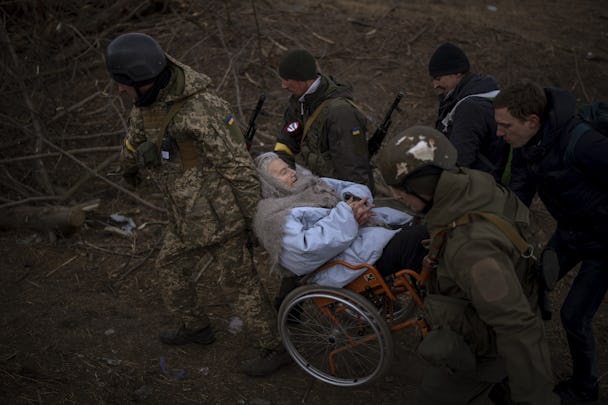Russian trade union federation defends Putin’s attack on Ukraine: ”A peace-building operation”
Russia’s main trade union federation supports Putin’s war in Ukraine, describing it as a righteous fight for ”denazification”. The ITUC is now discussing expelling the Russian trade union federation – but its ties to the Kremlin have been known for a long time.

Ukrainian soldiers help civilians evacuate Irpin on the outskirts of Kyiv.
On February 24, the same day as Russia launched its invasion of Ukraine, Russia’s main trade union federation, FNPR, adopted a statement supporting president Vladimir Putin’s decision to ”denazify” Ukraine.
The FNPR claims in the statement that Ukraine is controlled by nationalists and Nazi sympathizers. Russia’s war is termed ”peace-building”, and Ukrainian President Volodymyr Zelensky is equated with Hitler.
The statement was followed by a more detailed declaration in similar terms on February 25, signed by FNPR chairman Mikhail Shmakov.
”The statements are absolutely horrible. Within the International Trade Union Confederation, the ITUC, many are raising their voices for the FNPR to change their position or be expelled” says Oscar Ernerot, head of the international unit at the Swedish Trade Union Confederation (LO).
”I know that the leadership of the ITUC is discussing the issue. I do not think the FNPR will change. The outcome will probably be that the FNPR is thrown out.”
”Aware of the FNPR’s shortcomings”
The fact that the FNPR is closely aligned with the Kremlin has been well known for a long time. The question is why the ITUC, an organization for independent and democratic trade unions, nevertheless has accepted the FNPR as a member.
”We have been aware of the FNPR’s shortcomings. But internationally, trade unions are seldom perfect. They are often in a democratically difficult environment,” says Oscar Ernerot.
”The FNPR represents many millions of members. Thus, they are a power player in the ITUC. Expelling them before the invasion of Ukraine would have required difficult trade-offs.”
Supported the annexation of Crimea
German trade union advisor, previously a senior ILO official who spent a few years at the UN body’s Moscow office, has followed the FNPR closely.
”In the 1990s, many believed that the FNPR wanted to transform itself into a real, independent union. And attempts in that direction were really undertaken,” says Frank Hoffer, pointing out that the FNPR defended the independent unions formed in Belarus after the country’s independence.
But when Russia illegally annexed Crimea in 2014, the FNPR supported Putin and incorporated existing trade unions in Crimea.
The fact that the FNRP is still a member of the ITUC is due to wishful thinking, as other members are hoping that it will reform, says Frank Hoffer. But it also comes down to internal power politics.
”At the ITUC’s last congress, Sharan Burrow was elected General Secretary with the support of the FNPR. Without the Russian support, the candidate challenging her would have won.”
Detrimental to the ITUC
Granting membership to regime aligned trade unions is detrimental to the credibility of the ITUC, argues Frank Hoffer.
”The fact that the FNPR was part of the organization made the ITUC’s statements about the annexation of Crimea 2014 very soft, almost neutral. Even though it was clear who was attacking whom.”
According to several informed sources, the leadership of the ITUC is currently discussing the possible expulsion of the FNPR.
”There are three options. They can vote in favour of expulsion, vote against it or vote to postpone the decision. The latter two options would send very bad signals. The credibility of the ITUC is at stake,” says Frank Hoffer.
The FNPR
The Federation of Independent Trade Unions of Russia (FNPR) is by far the largest trade union organization in Russia. The FNPR represents 38 national and 82 regional unions with a total of 19.7 million members, according to the organization’s website. Mikhail Shmakov has been chairman since 1993.
According to the FNPR’s statement on February 25, ”the tragic situation” in Ukraine is rooted in a ”coup” in 2014, carried out by ”radical nationalists led by countries in the West”. Russia’s ”operation” is justified by war threats from Ukraine, provocations from ”a number of Western countries”, and the need to ”defend Russian citizens”. The latter refers to residents of the breakaway republics of Donetsk and Luhansk, to whom Russia has issued Russian passports.
Ukrainian President Volodymyr Zelensky won the 2019 presidential election by a wide margin. Zelensky, who is of Jewish heritage, is a native Russian speaker and conducted his election campaign almost exclusively in Russian. He received the most votes in almost all constituencies, even in the eastern parts of Ukraine where a large part of the population speaks Russian.








